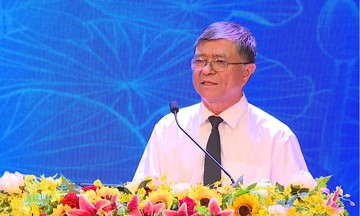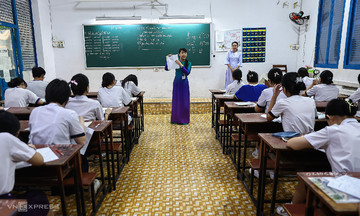The Ministry of Education and Training introduced a draft plan on Wednesday, 7/8, for developing strong research universities that closely integrate research, application, and training by 2035.
Tran Nam Tu, Deputy Director of the Department of Science, Technology and Information, a representative of the drafting team, said the goal is to develop 15-20 reputable public universities by 2030. These universities will specialize in research, application, and training human resources in priority technology areas of Industry 4.0 and advanced sciences.
The evaluation criteria include: Scientific publication capacity; Qualified teaching and research staff; Ability to receive funding and research budgets; Innovation ecosystem; Research infrastructure and equipment; International cooperation; and Social impact.
The number of scientific publications in reputable international journals is expected to increase by about 12% annually. The number of registered and granted patents is projected to rise by 20-22%. The country aims to have at least 50 strong research groups, with 30 of them reaching international standards in strategic technologies, high technologies, and other advanced scientific fields.
Additionally, each higher education institution is expected to attract at least 20 talented experts and scientists, either Vietnamese living abroad or foreigners, to participate in scientific research and teaching.
Among these institutions, at least two will receive significant investment and benefit from special mechanisms to become elite universities, modeled after world-class research universities.
Tu explained that "elite universities" represent a higher level than strong research universities. The drafting team will continue to research specific criteria for this designation.
 |
Tran Nam Tu introduces the plan to develop universities into strong research entities on Wednesday, 7/8. Photo: Nguyet Minh |
Tran Nam Tu introduces the plan to develop universities into strong research entities on Wednesday, 7/8. Photo: Nguyet Minh
From 2035 onwards, the country aims to develop 25-30 reputable public universities with leading strengths in research and application, and 3-5 elite universities.
During this period, international publications need to increase by 15% annually, and the number of patents by 23-25% each year. The higher education network is expected to form at least 70 strong research groups, with a minimum of 50 reaching international standards in strategic technologies, high technologies, and advanced scientific fields. Each university should attract at least 30 talented Vietnamese or foreign experts and scientists for teaching and research.
Tu stated that the plan to develop strong research universities aims to accelerate scientific research activities linked to application and human resource training, in accordance with Resolution 57.
To implement this, the Ministry has proposed four main solution groups: Researching and proposing mechanisms and policies for developing universities into strong research entities; Enhancing research capacity and connections for higher education institutions; Supporting the implementation of State – University – Enterprise cooperation methods; and Strengthening international cooperation and integration activities for Vietnamese higher education with reputable institutions abroad.
In February, the government approved Project 347, which focuses on developing a system of centers of excellence and talent by prioritizing investment in certain universities with demonstrated strengths.
The Ministry of Education and Training selected 13 universities to lead centers and training networks of excellence and talent in technology across 9 fields.
According to the Ministry of Education and Training, Vietnam produces about 18,000 international publications annually, mostly from institutes and universities. Last year, Vietnam National University - Ho Chi Minh City led the country with nearly 3,170 international research papers, followed by Vietnam National University - Hanoi and Hanoi University of Science and Technology (approximately 1,500-1,600 papers annually).
Le Nguyen












